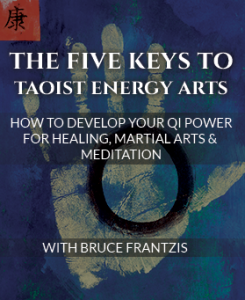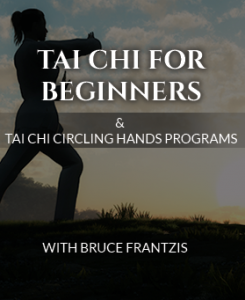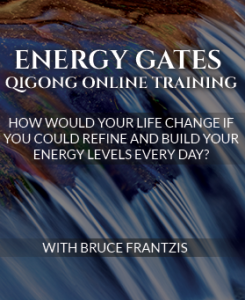Tai Chi is considered a low impact exercise, but there are many other low impact exercises such as aerobics, many forms of dancing and walking. So what exactly is the advantage of practicing tai chi over other low impact exercises?
What is the difference between normal, low impact exercises and tai chi? Is tai chi that much better?
Tai Chi – The King of Low Impact Exercises
There are a lot of articles about the benefits of tai chi,but in this post I want consider the main differences of tai chi compared to other low impact exercises. You have a choice on what you can practice so it is helpful to know how it is working and why you may want to practice tai chi rather than do something like take a walk.
Lets look at how tai chi compares:
Tai Chi Brings You Back Into Your Body
The first thing is that with normal, low impact exercises they’re often still very physical. Most low impact exercise have a tendency to work your muscles. Unlike tai chi they also tend to be done faster. The nature of movements in tai chi require the practitioner to operate in slow motion, and slow motion has a tendency to loosen up the body in the way that normal, low impact exercises don’t.
An adjunct to this is because of the degree of attention and concentration required to do tai chi, you must drop your mind into your body. This is not necessary the case with other low impact exercises such as walking where you can walk and at the same time daydream being completely in your head.
Tai chi is a exercise that helps bring you back in your body – something that is needed in our fast paced western world where many people are disconnected from their body.
Tai Chi Gets Your Joints Moving
A second important point is that while you are doing the movements of Tai Chi, the constant shifting weight back and forth between the legs, the constant change in the position, the incredibly wide range of arm movements get every joint in the body to fully articulate. Most low impact, aerobic exercises do not do that. That’s a special focus of tai chi.
Tai Chi Increases Circulation
A important third point is the way in which Tai Chi movements are done with very even slow motion rhythm. This boosts circulation in a way that goes deep to work with the small, tiny, blood vessels inside the body that most slow, low impact aerobics will do.
Tai Chi Develops Balance
Above and beyond this, doing Tai Chi has a way of developing balance (both inner and outer) because of the way you shift your weight from your forward leg to your back leg and all sorts of different positions and pick one foot off the floor constantly. It develops balance better than the vast majority of low impact exercises do.
For athletes developing better balance and body awareness result in higher performance. On the other spectrum, for seniors and those who are aging, any fall or bone break beyond the initial pain and medical costs, will seriously decrease the mobility and possibly result in chronic pain and a lower quality of life.
Developing better balance is a big thing that can not be overlooked and Tai Chi does it just about as good a job at this than anything I have encountered.
Tai Chi Principles are Unique
Tai chi simply does not follow the same physical principals that normal, low impact exercises do. Tai chi has its own unique principles that are significantly different from the way the western mind thinks about exercise.
I think it’s the slow motion nature of it, I think it’s the circular motion of it and I think it’s the nature of the way that it makes the body move in such a wide variety of positions and postures and articulations of your arms and your legs.
It is a combination of all these things together that make the benefits of tai chi so compelling and useful.
Is Great the Enemy of Your Good?
Lastly one of the statements that I have made is that Tai Chi has great benefits for people even when it is practiced poorly. After seeing many people do tai chi all I can say is that in general doing it even poorly is better than not doing it.
Now the great thing about tai chi is that just by doing it, no matter how bad or good you get results. This is an important point because I live in America and there is a great desire her to do things only if you can be great – but this reasoning just does not hold for tai chi. My mantra when I encounter this attitude is “Don’t let the great be the enemy of the good.”
So rather than only do it if you can do it perfectly, just do it and understand you are working toward great. You most likely will not reach greatness after taking a week course for a few months or even by attending an intensive seminar. Realistically it takes years and many hours of regular practice to bring any movement form to its full potential. This is also the carrot or the greatness that makes tai chi so appealing, because there is always another level to climb and always ways to deepen your practice.
I hope this post has been useful for you, I hope it encourages you to practice or learn tai chi. Please let me know what you think by leaving a comment below…I read all comments although often just respond to a few…





Very insite and concise as always. Your blogs help me enormously. Thank you
Dear Bruce:
I think your article is ‘right on.’ I have been practicing tai chi (yang style) for about 13 years; and I benefit, mentally and physically, with each class. I have hit several plateaus during my training (currently in one now) but with each period of time that I experience a ‘stall’ in my learning I know that a breakthru is on the horizon. Just like the moment with the eye of the hurricane is directly above you, I know that the energy is spinning all around. I may never be ‘great’ at tai chi; but I am better for the experience, the lesson, and the philosophy.
great post as usual!
I like it; very helpful to have more reasons to encourage people to play taiji.
I do have one question: I too have noticed that even new students and other students who do not do forms well still seem to benefit from taiji. Is this because most of us start from such a low point that even meager practice will benefit us? Or why? Will the gradual improvement of their form also increase their benefits?
Hi gary lee,
I’m an amateur, but my answer to your question is that over time the gradual improvement in my form has led me beyond benefits to no-benefit.
So now I can practice a form while my heart, my spirit, simply listens to the wind.
Take care,
Bob
This question is more complex than it seems and I may write a blog about it sometime in the future..
Best explanation I have read to the benefit and reason for studying Tai Chi. Also that it is a life time practice and not a quick fix to long term health and wellbeing. Thank you
Because I genetically inherited poorer than average body alignments, I find that the repetition of simple movements in nei gung brings me more benefit than the relatively complex movements of tai chi. For this reason, I stopped practicing tai chi after several years of practicing every day. By practicing the components of Cloud Hands and Circling Hands, I have finally learned how to get blood to circulate through much of my lower legs and feet. I’ve also made progress with getting energy to move through my left channel, which tends to be blocked. Maybe I would have gotten to this point if I had continued with the tai chi form, but I believe it would have taken me much longer and the path would have been less direct. (I practice from 1 to 2 hours every day.)
Diet ! One of the greatest things I have ever found in book form in my life is Spiritual Nutrition by Gabriel Cousens M.D. It explains in the greatest of detail how to prepare our bodies to handle higher more refined chi/prana/holy spirit so that our ability to change ourselves physically and spiritual at our deepest levels becomes wholey available . Genetics are NOT static . My thought would be figure out how clean your physical body is . Unless you are super organic raw foodist man the inside of your body has alot of badness (god bless the industrial revolution) heavy metals,GMOs,PCBs, etc etc . This robs your body of energy,chi,prana,HS . It takes a huge amount of energy to deal with these things and keeping you at your lowest genetic potential (PHENOTYPIC EXPRESION) . By the way I have way too much badness in me so I aint preachin but i have in my most disciplined times combined strong practice with proper fasting emphasis on proper and filling my body with foods and herbs of superior quality . The difference is beyond night an day . Its like pointin everything in the same direction ya know ? Good luck !
I am practicing TaiChi daily for 10 years, continue to learn it, feels like I am only at the beginning – and its a wonderful feeling and thinking.
You are awesome…wish I could have studied with you ten years ago…
I have been practicing Tai Chi for 13 Years. I am now 75 years old. Two years ago I slipped and broke my ankle in 2 places. Within a couple of months I was back not only to my Tai Chi class but, practicing Tai Chi on a daily basis. I feel that if I had never taken up Tai Chi, I could have been left with either arthritus or a limp. Maybe both.
I’ve been doing Wu style Tai Chi for over 20 years now but the last few years my feet and hands are getting very cold in winter — suggesting that my circulation is getting worse. Any ideas?
Best wishes
Ray
The first place I would look for is that the pumping of your Kwa and the way you get the sense of your fingers and your feet the sense of that. I don’t know if you have studied with me but we teach that all the time. Without seeing you I don’t know that I can be of help as it could be many things. There are three people in the UK that might be able to help you Brian Cooper in Brighton, Paul Cavel in London and Mathew Brewer – depending on your location.
Personally you would probably get a lot out of the instructor training next year.
Stay good,
Bruce
There are lots of I Ching books and I don’t read many of them. I prefer not to comment because I am not a translator. I know what is in the I Ching but not what is all of the books.
I have been told the best academic translation is this book:
http://www.amazon.com/Original-Ching-Oracle-Complete-Concordance/dp/1905857055/ref=sr_1_16?ie=UTF8&qid=1291407767&sr=8-16
Stay good,
Bruce
my first sortie onto this site – great descriptions! I am keen to try, being well over 65 but am having difficulty finding a teacher in this area – TN37 7QF or TN33 OAH. Wreford
I’m a 60 years old woman, who learned this many years ago, but like so many things, I didn’t practice it. Lately, over six month or more, I’ve had this constant pain on my back, upper left shoulder area. At first I thought is was just from stress. I’ve been unemployed for a long time and haven’t had much luck in my job search. So anyway, I remembered thinking what it said on the flyer with the many different names of the movesments. “It’s a Moving Meditation” So I started do these exercises again. Even though my back pain is still there, it hasn’t been as bad. I was just wondering whether they could be compared to some of the other work outs where you are targetting certain parts of the body, like your gutt. That my biggest problem. Since I had a C-Section back in my 40s, my stomach muscles have never been the same.
my sister in Miami just started taking a taoist tai chi class. I want to do the wsame tai chi as her are there different ones. I want to do it with her when I visit.
I down loaded your short videos in the past they are great and its good to know i not or need to be perfect. The point is bringing back blood flow to our organs and energy. I also feel as if i am getting rid of bad stuff. So thank you.
Thank you, Bruce, for your insightful articles. I came to Tai Chi when approaching age 60. I loved it, and within three months I was practicing between one and three hours a day, whatever time I could make. Within a year, I was assisting my teacher, and began teaching my own beginner class (per her request) within 16 months. This is now only my third year teaching and I love the continual learning. Your articles are inspiring and help me so much with my own class, who I also hope to in turn inspire. Tai Chi opens so many doors if you are receptive. I also love qigong, which I began just last year. I think if I’d have come to qigong first, though, I may not have liked it as much, but I sure love it now, and for the same reasons I wouldn’t have been as drawn in at the beginning (the repetition). It is so complementary and allied to the practice of Tai Chi. I have many books now on both subjects, including yours. Thank you so much for sharing your immense knowledge and wisdom.
The benefits of practicing Tai Chi are myriad. For me the most vital is relearning to breathe and getting to the source(stress) of what the AMA calls chronic asthma. Getting in closer touch with my body through balanced and smooth movements has allowed me to let go of subtle contractions rooted in mind but manifesting in body. Limited no more; exquisite!
I think what is happening is the conditioning of the stabiliser system. Slow movement loads and emphasis the joint stabilisers. The reparative nature of Tai Chi trains motor control or the communication between the brain and the muscles. We are a seated society. When you sit, or lean on a walking stick or frame, or go to a western gym and sit on equipment, that seat stabilises you and your personal stabilisers turn off. Then your doctor tells you to go and exercise. The end result is movement through unstable joints leading to wear and tear and the joint pain all western seniors seem to have. If you compare western fighting to Asian martial arts for example, in the West you are finished at age 25, because it is all about bigger stronger faster. In Asia you see people in their 70s still practicing. It is also interesting to compare modern exercise gyms and the bodybuilding influence (looks not function) to historical exercise methodology. Today it is about heavier loads and fewer repetitions while previously it was all about time and repetitions to achieve fluid movement.